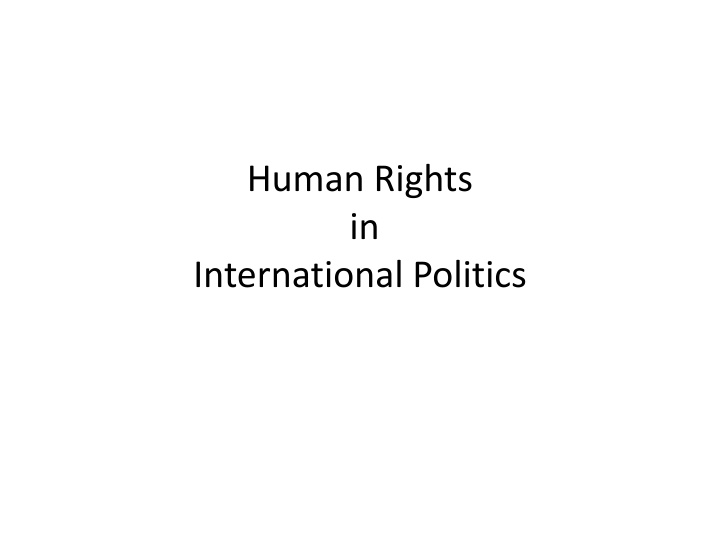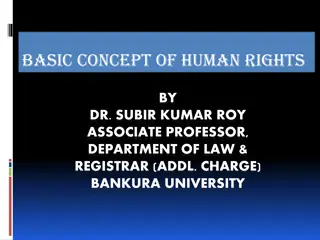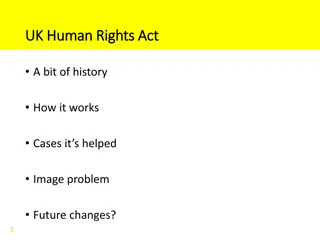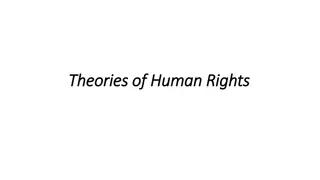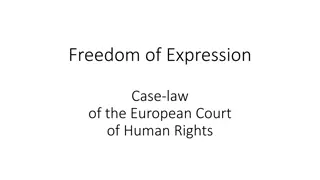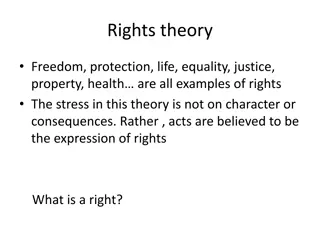Evolution of Human Rights in International Politics
Explore the historical progression of human rights through pivotal documents such as the American Declaration of Independence, French Declaration of Rights of Man and of the Citizen, and the Universal Declaration of Human Rights. Delve into the foundational principles, the four pillars of the UDHR, country-specific procedures, and core human rights treaties shaping global standards for dignity and equality.
Download Presentation

Please find below an Image/Link to download the presentation.
The content on the website is provided AS IS for your information and personal use only. It may not be sold, licensed, or shared on other websites without obtaining consent from the author.If you encounter any issues during the download, it is possible that the publisher has removed the file from their server.
You are allowed to download the files provided on this website for personal or commercial use, subject to the condition that they are used lawfully. All files are the property of their respective owners.
The content on the website is provided AS IS for your information and personal use only. It may not be sold, licensed, or shared on other websites without obtaining consent from the author.
E N D
Presentation Transcript
Human Rights in International Politics
Preamble to the Declaration of the American War of Independence, 4 July 1776. We hold these truths to be self-evident, that all men are created equal, that they are endowed by their Creator with certain unalienable Rights, that among these are Life, Liberty and Pursuit of Happiness.
French Declaration of Rights of Man and of the Citizen, 1789 Men are born free and remain free and equal in rights. Social distinctions can be founded only in the common good. (Article 1) Sovereignty resides in the nation and the authority of any individual emanates from it. (Article 4)
Universal Declaration of Human Rights, 10 December 1948 All human beings are born free and equal in dignity and rights. (Article 1) Everyone is entitled to all rights and freedoms in this Declaration without distinction of race, colour, sex, language, religion, political or other opinion, national or social origin, property, birth or other status . (Article 2)
The four pillars of the UDHR The right of everyone to life, liberty and personal security. (Articles 3- 11). Social and civil rights: right to free movement, to own property, to marry. (Articles 12-17). Political rights: right to peaceful assembly, to freedom of expression, participation in government through elections. (Articles 18-21). Economic rights: right to social security, to leisure, to employment, to equal pay for equal work, to health care, to education. (Articles 22- 27).
Country-specific Special Procedures Belarus Cambodia Central African Republic Cote d Ivoire Eritrea DPR Korea Haiti Iran Mali Myanmar Occupied Palestinian Territory Somalia Sudan Syria.
Nine Core Human Rights Treaties Name of Convention Name of Treaty Body Year of Adoption/ Entry Force International Convention on the Elimination of all Forms of Racial Discrimination CERD 1966/1969 International Covenant of Civil and Political Rights Human Rights Committee 1966/1976 International Covenant on Economic, Social and Cultural Rights CESCR 1966/1976 Convention on the Elimination of All Forms of Discrimination against Women CEDAW 1979/1981 Convention on the Rights of the Child CRC 1989/1990 Convention against Torture and Other Cruel, Inhuman or Degrading Treatment or Punishment CAT 1984/1987
Nine Core Human Rights Treaties Ratified by Select Countries Brazil 8 All except CMW Germany 8 All except CMW France 8 All except CMW Japan 7 All except CMW & CRPD United Kingdom 7 All except CMW & CED India 6 All except CMW, CED & CAT Russia 6 All except CMW, CRPD & CED South Africa 6 All except CMW, CED & CESCR China 6 All except CMW, CED & ICCPR United States 3 Only CERD, ICCPR & CAT
